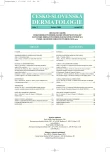-
Medical journals
- Career
Diagnostic and Therapeutic Perspectives of DNA Analysis in Psoriasis
Authors: V. Vašků; V. Semrádová
Authors‘ workplace: 1. dermatovenerologická klinika LF MU a FN U sv. Anny v Brně přednosta doc. MUDr. Vladimír Vašků, CSc.
Published in: Čes-slov Derm, 81, 2006, No. 3, p. 143-147
Category: Clinical and laboratory Research
Overview
Etiopathogenesis of psoriasis includes four characteristic features – inflammation, hyperproliferation of keratinocytes with their abnormal differentiation, hyperproliferation of endothelia and inhibition of keratinocyte apoptosis. Because of familial occurrence of psoriasis, a contribution of genetic factors to etiopathogenesis must be considered. As a result of statistical analysis of genotyping of psoriatic patients as well as control subjects in selected gene polymorphisms, several DNA markers for psoriasis were proved in the Czech population. There are genotypes AG and GG in 2184 G/A RAGE (advanced glycation end products receptor, odds ratio = 2.25, P=0.00004) and the heterozygote genotype A/AA in A39526AA retinoid X receptor α polymorphism in women with psoriasis against the men with psoriasis (odds ratio=2.22, P=0.002). Further, the risk heterozygote genotype GA in polymorphism -596 G/A of interleukin 6 gene was found (odds ratio=1.83, P=0.008) for psoriatic patients with positive family history. All these risk genotypes can cause different responsiveness to psoriasis therapy.
Key words:
psoriasis – polymorphism – SNP-gene – DNA-marker
Labels
Dermatology & STDs Paediatric dermatology & STDs
Article was published inCzech-Slovak Dermatology

2006 Issue 3-
All articles in this issue
- Psoriatic Arthritis
- PASI Score Yesterday, Today and Tomorrow
- Diagnostic and Therapeutic Perspectives of DNA Analysis in Psoriasis
- Quality of Life in Patients with Psoriasis Vulgaris I. The Impact of Therapy on the Quality of Life
- Profilometry
- Comparison of Efficacy between the Two Photosensitizers in the Photodynamic Therapy of Cutaneous Tumours
- Czech-Slovak Dermatology
- Journal archive
- Current issue
- Online only
- About the journal
Most read in this issue- PASI Score Yesterday, Today and Tomorrow
- Profilometry
- Psoriatic Arthritis
- Comparison of Efficacy between the Two Photosensitizers in the Photodynamic Therapy of Cutaneous Tumours
Login#ADS_BOTTOM_SCRIPTS#Forgotten passwordEnter the email address that you registered with. We will send you instructions on how to set a new password.
- Career

